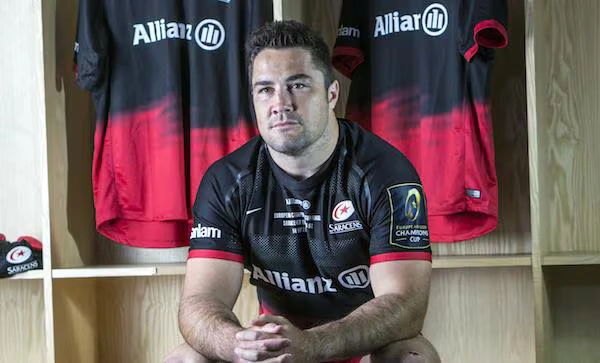“Brad is so competitive that you stay away for him in training” – Chris Ashton
Brad Barritt has become one of those names in rugby synonymous with the professionalism in the sport. The South African born England and Saracens centre has rapidly developed a reputation for being a hard-hitting but always controlled player. To his teammates, he is seen as a tough-tackling and reliable safe pair of hands. In person Brad is charming, relaxed but incredibly focused on what he needs to do come match day.
The modern game of rugby is…
A collision sport. There’s a lot of wear and tear on the body in terms of big hits you take. But also the amount of running and excess you put on your joints. It’s a high impact sport so it has a big accumulation of factors on your muscles and your joints.
Preparation is…
Huge. From the pre-season to the ongoing rehabilitation of the body. Every other week you’re recovering from a game. So there is a recovery process but then a strengthening process in the aim of peaking on a Saturday. There’s a huge amount of time and expertise that goes into getting your body in the right shape to play.
Timing is everything
You’ll go through certain blocks throughout a season: a strength phase, a power phase, a rehabilitation phase, aiming to produce the best results you can at a specific time in the season.
If you don’t listen to your body…
You’ll get to a point where a joint is irreparable. The ongoing process of keeping joints healthy and mobile is hugely important for a rugby player in getting the best out of their body. That’s where a product like Flexiseq has really set the bar in allowing players to function at their optimum and condition a joint to allow them to do what they need to do.
Flexiseq has become…
Part of my day to day regime, it’s helped me through a few serious injuries, two operations, most notably my foot and ankle. It helped me turnaround in terms of my recovery to play in record time in both circumstances. Since then I’ve had so much trust in the product. It’s something I actively use daily.
Joint issues in rugby have increased because…
The game is getting quicker, players are getting bigger and faster. But also the amount of games you play in a regular season: you’re close on 35 games a season which is nearly double what it was 15, 20 years ago. The seasons are running far longer, there’s only really one month off from rugby. Keeping yourself healthy during the season is paramount to your longevity in the sport.
Innovations have changed the game because…
Of how a player can manage these injuries. For so long, in terms of joint pain, it was a case of masking it. That’s a huge part of Flexiseq, it leaves joints feeling better by helping to keep them well lubricated. It’s a true innovation especially in that previously we’d have to be injected for that sort of treatment.
Knowing something is drug free is….
Massive. You can’t underestimate the peace of mind you get from using a product that’s trusted and has that seal of approval. It gives that added benefit as a player knowing it’s going to do a lot of good.
Injuries in modern rugby have escalated because…
You see far more impact injuries which is the nature of the speed and the power now. There’s a lot more join-related damage. There’s people who are suffering high velocity foot injuries. The accumulation of wear and tear injuries is far higher. There’s an increase in players having to retire due to injury than there was twenty years ago. It’s a combination of the professionalism but also the number of games per season.
For rugby players…
Your ankles and knees are everything in terms of your speed, your power, your agility. Then your shoulders are your greatest weapon and ally on the pitch in protecting yourself in tackles.
My worst injury was…
My foot. I had an operation to repair ligament damage in a joint. That was a five month injury so involved being on crutches for three of those five months. It made day to day living pretty tough, things like driving, all the things you take for granted and enjoy as part of your life become a strain. That was my first experience with Flexiseq. I’d had this operation, usually return to play time was about eight to nine months. So to be able to play within five was a huge credit to the physio staff who worked with me in rehabilitating but also due to innovations like Flexiseq that provided me that extra support.
The medical team are…
Brilliant. The amount of time and dedication they put in and the service they provide to the team is amazing. They’re the less spoken about in this professional game but often the most important people. They put in long hours and always have the players’ best interests at heart.
The most professional player I’ve worked with is…
Steve Borthwick. He was meticulous in what he did. Not only in how he approached the game but how he prepared for matches and his rehabilitation and everything he needed to do get his body ready for a game. It’s a testament to his distinguished career he had and all his achievements.
I hope to never be tackled by…
Jacques Burger. He has always been highly praised for his hits. Thankfully I’ve never been on the receiving end of one. But I do remember my early first years as a young player being hit by a guy called Rodney So’oialo for The Hurricanes and ex All Black. I was probably nineteen at the time so it was quite a memorable one.



